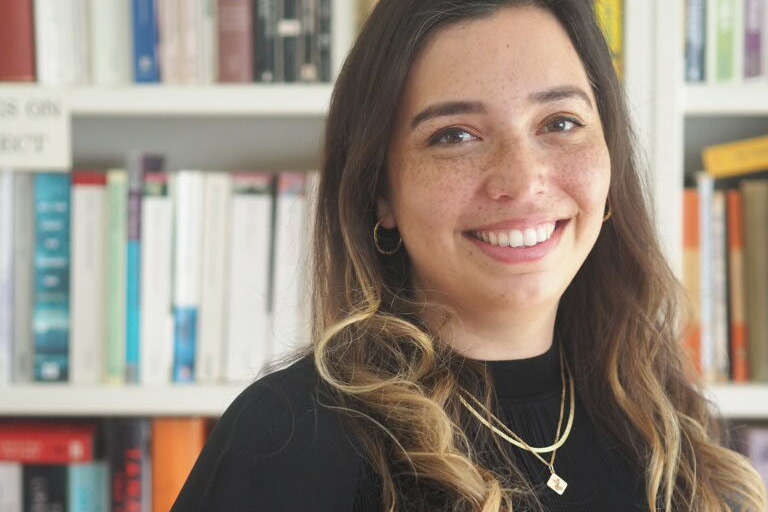First ever Discoveries winner, Emma van Straaten has just landed her first publishing deal with Little, Brown Books! She sat down with Curtis Brown to talk about what the experience has been and how Discoveries helped her writing career.
How did winning the inaugural Discoveries Prize in 2021 impact your writing journey?
It was the first time I had dared to think of myself as a writer. With typical bad timing, I had my first baby the week I was told I’d won Discoveries, so there was a sense of pressing the accelerator and the brakes at the same time: two seismic life events colliding, causing immense pride, as well as anxiety: what happens now?! It was extremely validating to have the judges – all women I look up to and admire – say nice things about my writing, which gave me the hope that perhaps I could be published one day, after all. Once my head had cleared from the new baby fog, I felt so motivated – more determined than ever to complete the manuscript to a standard I was happy with, and to see where I could take Heartstring.
Discoveries has also impacted my writing journey by introducing me to a series of wonderful communities: Curtis Brown, Curtis Brown Creative, the Women’s Prize Trust and the Discoveries cohort, which grows year on year. I am now part of the most supportive, digressive, and inspiring WhatsApp group (in fact with the 2022 cohort!), which has transformed my writing experience from feeling quite alone, bashing at my computer in my pyjamas, to feeling part of a warm, kind, talented gang.
Discoveries only requires entrants to submit the opening 10,000 words of their novel, plus a synopsis. How much of the novel did you have written before you entered Discoveries?
I had written a novella – about 40,000 words – and had just tentatively started weaving in a subplot when I submitted the opening 10,000 words. I wasn’t happy with the length: I knew there was more to the story, I just needed the time and motivation to find it.
Part of your prize was an offer of representation from Curtis Brown literary agent Lucy Morris. What work did you do with Lucy to get Heartstring ready to submit to publishers?
Lucy was so brilliant in helping me realise my “vision” for the book, and looking at the bones that I had written and seeing the potential for depth. She had an extraordinary ability to look at the manuscript as a whole and suggest I try something that immediately made things that have previously not quite aligned, fall into place. As a first-time novelist I found her input to be absolutely invaluable. I will always be grateful to Lucy for her patience and understanding too; the aforementioned baby meant I essentially didn’t write anything of note for a whole year, but Lucy was wonderful and never once put pressure on me to be more productive. Once I was ready, however, she was brilliant: attentive and thoughtful, sending detailed notes and really considering how I could make Heartstring the best it could be. Heartstring wouldn’t be the book it is without her!
Fast forward two years, and now Heartstring will be published by Fleet (Little, Brown) in 2025. How does it feel knowing that you’re going to be a published author?
It’s surreal, to have something you have dreamed about (and worked for!) for years slowly materialise into something tangible, something I will be able to hold. It’s also slightly terrifying; this dark, strange, unlikeable character, who has lived in my head for so long, will finally be revealed to others – strangers, and perhaps most alarmingly, my family…
Heartstring follows cleaner Alice, who is infatuated with a client she has never met. Your tale of obsession hooked the Discoveries judges and your editor Rhiannon Smith. What initially inspired the character of Alice and her story?
When I was a student, I cleaned for a couple who lived in the same block of flats as me. After the initial meeting where they agreed to hire me, we corresponded by a little notebook on the kitchen worktop and I let myself in after they’d left for work, so I never saw either of them again. But I was around their things for hours every week – clothes, photos, the remnants of their breakfasts. It was fascinating and unsettling, and I found myself making assumptions about them from the objects in their flat. I never forgot that feeling and, later, while searching for ideas for a short story, wondered what might happen if that curiosity became invasive, and extreme.
What advice would you like to share with the writers thinking of entering Discoveries 2024?
Don’t hesitate – if you have your 10,000 words, go for it (and if you don’t, there will always be next year)! The prize is such a gift and an opportunity, and it’s free to enter. It may be the first time you’ve shown your work to anyone else – that alone is valuable, and the first step towards that tentative dream so many of us have: to write, and to have readers. I am so grateful for the opportunities that Discoveries has given me, and am so excited for more unpublished female writers to take part in the magic.







